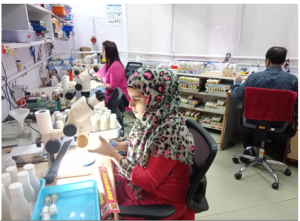What should you know before knocking an infertility clinic?

Article by Neucrad Health India April 8, 2019
Pregnancy is one of the most incredible moments in the life of couples, but, it can be elusive at times. Every couple may not be lucky enough to become parents naturally. It is when they knock the doors of various infertility clinics. Functions of these clinics are to assist couples in getting pregnant naturally. At first, they conduct multiple diagnostic tests on both the male and female partner to detect the exact reason behind the difficulty in conceiving. Then, they suggest ways of meeting the challenges associated with infertility by implementing assisted reproductive technology (ART) treatments.
What May Go Wrong At The Infertility Clinics?
At this stage, you must always remember things do not work out as planned. Some infertility clinics in India take advantage of the innocence and nervousness of couples and carry out rampant malpractices at their premises. Moreover, most of the tests and treatments carried out by them are not standardised by any laboratory. Here is a write-up pointing out the loopholes in these clinics.
What Are The Tests Carried Out At Infertility Clinics?
Infertility clinics all over India conduct multiple tests on both male and female partners to ascertain the cause of difficulty in conception. Detailed below are some of the popular diagnostic tests implemented in these clinics.
Laboratory Tests For Men
Andrologists usually recommend semen analysis, hormonal testing, genetic testing, testicular biopsy, transrectal or scrotal ultrasound, vasography, and bone mineral density scans for men. These tests determine the abnormality present in the body which interferes with the successful fertilisation of sperms and ovum.
Laboratory Tests For Women
Similar to men, there are several diagnostic tests for women to gain a clear picture of the reproductive tract and the production of healthy ovum at the end of each reproductive cycle. Gynaecologists prescribe ovulation testing, hysterosalpingography (assess the presence of blockage in fallopian tubes and the condition of the uterus), ovarian reserve test, hormonal tests, and hysterosonography. After the conduction of these diagnostic tests, fertility specialists implement the appropriate treatment procedures like stimulating ovulation with fertility drugs, intrauterine insemination (IUI), or in vitro fertilisation (IVF).
Common Malpractices In Infertility Clinics
Every medical treatment procedures involve some amount of risk. However, in the case of infertility clinics, often the chances of these associated medical risk increase manifold due to the negligence or malpractices of the health care providers. Detailed below are some of the common glitches noticed in these clinics.
Poor Treatment Management Resulting In Injury Of Patients
Sometimes doctors and other members of the medical team may act carelessly during investigation and treatment practices leading to injuries or health issues in patients. Many women suffer from ectopic pregnancy due to faulty implantation of the embryo in the fallopian tube. Sometimes doctors fail to identify initial distress signals of the foetus resulting in childbirth with a congenital deformity or even stillbirth. In some instances where patients require donor sperms or ovum, infertility clinics fail to conduct proper screening of donors.
Embryo Mix-up Can Lead To Women Carrying Another Couple’s Child
Physical negligence during IVF can result in mix-ups of embryos where women would end up in carrying the foetus of another couple. It causes tremendous mental stress on couples who spend lakhs of rupees in the process of bearing a child. Though these issues are rare, it can happen at those fertility clinics who do not take documentation and security issues seriously.
Unintended Multiple Pregnancies
There is a regular practice of creating multiple embryos in the fertility clinics to be used during the IVF cycles. In a bid to make the process successful, doctors carry out multiple embryo implantations on the would-be mother. Sometimes, this leads to multiple pregnancies in a single cycle, and parents have to take a tough decision whether to carry on or abort one of the embryos. Physicians can prevent this situation by better medical oversight.






